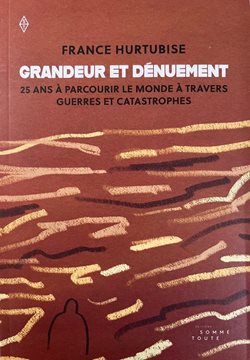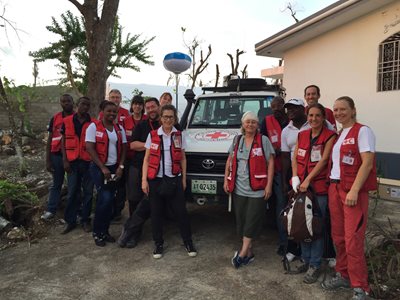 France Hurtubise, a retired Communications delegate dwelling in Montréal, appears again on her expertise within the humanitarian sector and shares her story with us. Over the course of 25 years working overseas, France traveled to 4 continents and labored in nations closely impacted by conflicts and disasters.
France Hurtubise, a retired Communications delegate dwelling in Montréal, appears again on her expertise within the humanitarian sector and shares her story with us. Over the course of 25 years working overseas, France traveled to 4 continents and labored in nations closely impacted by conflicts and disasters.
 In Could 2022, she revealed “Grandeur et dénuement”, an account of her years with the Crimson Cross (ICRC, IFRC and CRC) and the UN.
In Could 2022, she revealed “Grandeur et dénuement”, an account of her years with the Crimson Cross (ICRC, IFRC and CRC) and the UN.
In her phrases:
I start the chapter on Sarajevo with the phrase epicenter, which the dictionary defines as: The purpose on the earth’s floor the place the consequences of an earthquake are felt most strongly. I didn’t select this title randomly. Right here is an excerpt from my story: “In some ways it’s a suicide mission. Working as an ICRC communications delegate has its pitfalls. You could grasp the artwork of the parry when journalists ask questions. The ICRC doesn’t reveal sure info, which it considers confidential. Basically, that is to guard the folks within the subject who’re affected by the occasion and to keep up its neutrality. However not at any price… The ICRC’s dedication to confidentiality just isn’t a vow of silence; public calls on fighters to adjust to their treaty obligations are more and more changing into the norm. My boss describes Sarajevo because the hub of the media world, a showcase for the ICRC and a vacation spot for the politico-humanitarian jet set. She’s not utterly off the mark. Plenty of well-known public figures requested to journey to Bosnia to expertise historical past within the making.”
Sarajevo was my first ICRC mission as a communications delegate in a metropolis ravaged by a extremely publicized and extremely politicized battle. It taught me the true which means of the precept of neutrality.
Right here is one other excerpt: “As quickly as I arrive, I can see the horror all over the place, in each road. I’m struck by how shut the troopers, Serbs and different belligerents, are. The trapped residents really feel claustrophobic. I’m obsessive about one query: How can these males calling themselves troopers and brothers goal girls carrying jugs of water?
As I write these traces, scattered pictures of the start of my mission come to thoughts. I recall the Bosnian Muslim metropolis of East Mostar, abandoned, naked, silent; destroyed by Croatian artillery. Throughout the river, the western a part of town, which is predominantly Croatian and Catholic, is barely affected by the conflict.
Nestled on the banks of the Danube, Vukovar, as soon as a affluent metropolis, is not more than a pile of rubble. I’m overcome with unhappiness and incomprehension as I wander by its abandoned streets the place indiscriminately destroyed homes modestly reveal themselves all through the devastated metropolis. The majestic Danube eternally flows alongside its course in silence, disdainful of the wars of males.
Right here I’m in Sarajevo which, regardless of all the things that has occurred, nonetheless provides up surges of life and vibrant alleyways. The motive force takes me to the home that will likely be my house, positioned in the course of an enormous subject of stones; unusual naked floor devastated by artillery shells. There’s a feeling of desolation. He tells me with a sure irony that the Serbian opponents like pretending that the muffled explosions are brought on by incidents when fuel begins to circulation once more, and that nocturnal machine-gun bursts are demonstrations of pleasure. Everybody right here demonizes the Serbs. I’m nonetheless overwhelmed by what I realized a few years later. Actuality could be very totally different from what I see in August 1995.”
The day by day problem was working in a besieged metropolis the place every individual noticed just one model of the conflict whereas understanding that there have been so many victims of this atrocious conflict past Sarajevo.
I’ll finish with a final excerpt that sheds extra gentle on the challenges of a communications delegate: “Day by day, I drive by the ravages of this cruel conflict in my armoured car, carrying my helmet and guarded by my bulletproof vest. To my proper, I see slender buildings dotted with gaping holes, patched up with plastic sheeting, and all over the place, I see wrecked vehicles parked unexpectedly on the sidewalk. By way of these devastated streets, I head to the Vacation Inn resort, which has turn into well-known because the overseas journalists’ headquarters, regardless that it’s within the line of sniper hearth. I’m barely capable of squeeze my car into the underground car parking zone. Automobiles are parked carelessly, some blocking the way in which to those that arrived earlier. I lastly discover a house and hope I’ll be capable of exit this rat entice later.
Superstar journalists from the biggest American and European networks are on the resort bar, drink in hand. For a lot of, consuming will turn into a crutch that will likely be inconceivable to put aside. I meet an American camerawoman who has seen so much throughout her lengthy profession. She wears a watch patch, a memento from a chunk of shrapnel that blinded her and left a gaping gap in her proper cheek. She calls me over and tells me that CNN needs to interview me in regards to the Srebrenica tragedy.
I arrived in Sarajevo the day after the autumn of Srebrenica, a small mountain city simply over 100 km from the capital. Some 8,000 Bosnian Muslims have been killed by Bosnian Serb forces. It was the worst conflict crime dedicated in Europe because the Second World Struggle.
From the primary day of my arrival, I sat subsequent to the United Nations spokesperson as journalists peppered me with questions. They didn’t see what ICRC delegates noticed and heard within the subject. ‘What’s the state of affairs? Are you able to affirm that it was Serb forces who killed these males? Have you ever spoken with Serbian authorities and what did they are saying?’ The solutions weren’t all the time what they anticipated. I’m answerable for defending my colleagues and the hostages within the subject. I can’t reveal sure info. However how else do you convey misery aside from by screaming? To really perceive, is it not important to really feel, to pay attention, to see with your personal eyes? Conveying one’s impressions to folks dwelling hundreds of miles away who don’t know of the political and humanitarian state of affairs of these unjustly focused by hate whereas filtering what is claimed to the media is a large problem.
Because the weeks go by, I make mates with a number of journalists that I belief. I share important info with them in order that the entire world can perceive the extent of the atrocities dedicated right here, making them promise to not reveal their supply. The ICRC should preserve the authorities’ belief as a way to proceed to guard these affected by the occasion. It achieves by remaining impartial, however by no means on the expense of human dignity. The group doesn’t chorus from publicly commenting on sure conditions, but it surely should keep away from any unilateral or overly specific condemnation of one of many events.
However, right here in Bosnia, the road has been crossed. It’s inconceivable, even immoral, to stay silent. In an announcement, the ICRC expresses public outrage and calls for justice, ‘With regard to Srebrenica alone and on the idea of recent contacts with the households of those that went lacking through the fall of that enclave, the ICRC has come to the conclusion that greater than 5,000 have suffered such an atrocious destiny. […] We’re satisfied that the previous fighters do have the required data to determine the destiny of many of the lacking individuals.’
I’m a communications delegate in Sarajevo. Saying that it’s a large problem is an understatement. You could attempt to perceive the incomprehensible in a Slavic language and discover your approach across the multitude of metropolis names which are overseas to your ears like Banja Luka, Tuzla, Brcko, Bihac, Bosanska Krupa, Vukovar and lots of others! Within the hours following my arrival in unknown territory, I need to determine what is occurring as a way to rapidly share the knowledge with the media and my colleagues, whereas being cautious to not fall into the unhealthy entice of disinformation, a weapon that’s utilized by a number of the media in addition to by the authorities.”

France (center) with colleagues in Haiti
Associated tales
A smile brings hope in Haiti – France Hurtubise
Canadian Crimson Cross helps Nepalese kids who’ve suffered by two earthquakes
Psychosocial assist important after Hurricane Matthew



